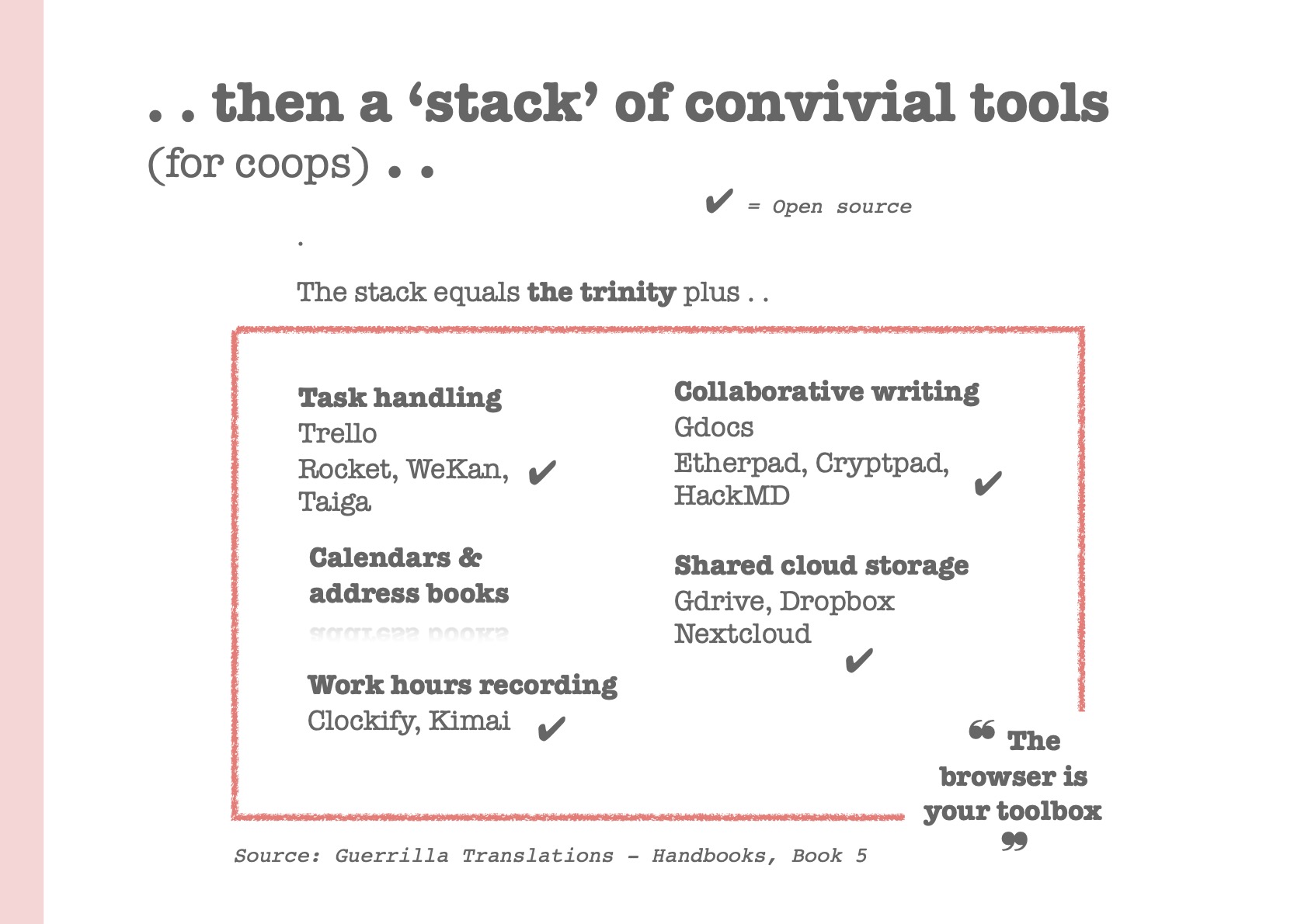Guerrilla Translations, whose notion this is, call these five classes of tools *convivial tools*. What they're referring to is Ivan Illich and his notion of Tools for conviviality.
I feel 'tools for conviviality' is a way of thinking that warrants a lot of attention now; *again*. It was first voiced 50 years ago but there is a lot that we still don't do, or aren’t very fluent in, or haven’t interpreted yet, in practical digital terms. Ivan Illich

Convivial tools - The stack
Compared with the Trinity, which comprises primary means of being in touch and exchanging understandings, the Stack is much more about knuckling down to working together. In the slide above, this is expressed in terms of coops but campaign organisations, and 'movement' organisations and activist formations in civil society generally, can be approached in the same way.
The stack is about coordination, it's about making things happen; it's about making conteributions as a team or community of makers, rather than just pushing ideas around. or being in touch
# Task handling is one of the stack generic applications. People might use *Trello* for this, there are various kinds of 'kanban' systems: WeKan, Taiga, Focalboard. If you're seriously doing things you've got to handle tasks: someway or other you've got to know who's doing which task, whether it's done yet, what stage it's at.
# Calendars, address books It's kind of obvious and mundane, but we can't manage without them. Some people picture this in terms of client relationship management tools. Generalising, we could tag this type of tool as handling **shared links with the other actors** in the collaborators’ shared world.
# Recording work hours If you're collaborating together in certain ways then you're going to need to record work hours. This is not only about getting paid, it's also about fairness and about knowing transparently and routinely who's doing what. It's about being able to look at your own balance of labor, as well - your own range of contributions - and reflect on it.
# Collaborative writing Not everybody is in the writing business, like Guerrilla Translations; but i think every medium to long-term organisation has to collaboratively write something at some time. So the capacity to collaboratively write is part of the stack.
# Shared cloud storage has become much more visible since DropBox and Gdocs kicked in. On the free tool platforms it's relatively rare to find shared cloud storage as part of what's offered. Collectively filing things is utterly important here if we're in this for the long haul.
The NextCloud family of tools is built around a cloud for sharing files and making them accessible across locations and devices. Some of the other tools in the Nextcloud stack are less than brilliant, but the Files app is core. The web interface isn't the most brilliant either, but handling files in a local replica of the folder (via the Nextcloud local app) works very well.
# The browser is your (shared) workspace . .
While we're on this idea of the stack . . if you look in the Guerrilla Translations handbook, as well as talking about the tools they talk about their **workflow**. That's really worth reading. Handbook page ![]() . Last time I looked though, the site was down. Here's another source pdf
. Last time I looked though, the site was down. Here's another source pdf ![]()
They've thought carefully about their workflow as a collective (document production, is what they do), and the way that the toolset is available to each person in their workspace (‘the browser is your toolbox’).
Your workflow or my workflow might not be the same as theirs (although using **the browser** fluently is probably basic, when working with tools in the Cloud, handling *distributed digital materials*), but I think the attention they've given to this is something every movement organisation needs to be able to mobilise, to be able to deal with. Basic literacy.
Some elements of the Stack are needed for activist collaborating, regardless of whether a formal organisation is involved, or livelihood and billing for time. So perhaps they should be promoted to an Extended trinity.
--- See also: Specials